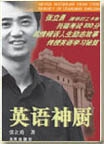英语谚语词典-第15部分
按键盘上方向键 ← 或 → 可快速上下翻页,按键盘上的 Enter 键可回到本书目录页,按键盘上方向键 ↑ 可回到本页顶部!
————未阅读完?加入书签已便下次继续阅读!
多听少说。
1397。 Still waters run deep。
静水流深。
1398。 Silence is the best ornament of a woman。
沉默是女人的最好装饰。
1399。 The best 'greatest' fish keep 'swim near' the bottom。
好鱼水底游。
有价值的东西不能轻易得到。
1400。 After a storm es a calm。
暴风雨后天平静。
雨过天晴。
1401。 Quietness is best。
宁静最好。
1402。 Woe to him that is alone。
孤独的人最可悲。
29.外表?虚假
1403。 Appearance often deceives。
1404。 Appearances are (often) deceive。
外表常具欺骗性。
不可以貌取人。
1405。 Don’t judge by appearance。
1406。 Never judge from appearances。
1407。 Never judge people by their appearance。
1408。 Judge not according to the appearance。
不可根据外貌判断。
不可以貌取人。
1409。 Men are not to be measured by (in) inches。
人不可以身材高低来衡量。
人不可貌相。
1410。 Men’s characters are not always written on their foreheads。
人品不一定都写在额头上。
知人知面不知心。
1411。 Don’t judge men or things at first sight。
1412。 Judge not of men and thing at first sight。
不可凭最初的印象看人论事。
1413。 Don’t look upon the vessel; but upon that which it contains。
不要只看瓶子,而要看瓶子里装着什么。
1414。 The habit 'cowl; hood' does not make the monk。
1415。 It is not the hood that makes the monk。
穿上袈裟不一定就是和尚。
不可以貌取人。
1416。 Beauty is but skin deep。
美丽只是皮相。
不能以貌取人。
1417。 In appearance place no trust。
1418。 There is no trusting to appearance。
外表不可信。
1419。 Fair without but foul within。
外善内奸。
金玉其外,败絮其中。
1420。 A fair face (but) foul heart。
面孔漂亮,内心肮脏。
1421。 It’s not the gay coat that makes the (fine) gentleman。
君子在德不在衣。
1422。 Clothes don’t make the man。
人品好坏,不在穿戴。
好马不在鞍,人美不在衫。
1423。 Fine feathers do not make fine birds。
羽色美不见得鸟就美。
好马不在鞍,人美不在衫。
1424。 It is not only the feather that makes the bird。
鸟美不单凭羽毛。
1425。 The face is no index to the heart。
面孔反映不出内心。
知人知面不知心。
1426。 Clothes make the man。
1427。 Fine clothes make the man。
1428。 The coat 'garment; tailor' makes the man。
衣着予人风采。
人靠衣服马靠鞍。
1429。 Fair feathers make fair fowls。
1430。 Fine feathers make fine birds。
漂亮的羽毛会使鸟美。
1431。 The face is the index of heart 'mind'。
面孔反映内心。
观面便知心。
1432。 A good face is a letter of remendation。
漂亮的面孔就是一封推荐信。
1433。 A fair face may hide a foul heart。
漂亮面孔后面可能隐藏着一颗龌龊的心。
1434。 The handsomest flower is not the sweetest。
最美的花不一定是最香的。
1435。 Things are seldom what they seem。
事物很少像其表面看起来的那样。
事物往往名不符实。
1436。 All are not saints that go to church。
到教堂做礼拜的未必都是圣徒。
1437。 He looks like a saint but the devil he is。
看上去像圣人,其实是魔鬼。
道貌岸然,内心凶残。
1438。 I fear the Greeks; even when bringing gifts。
希腊人带礼物来,没安好心。
1439。 A crown is no cure for the headache。
王冠难治头痛。
1440。 Poison is poison though it es in a golden cup。
纵然装入金杯,毒药还是毒药。
1441。 A forced kindness deserves no thanks。
虚情假意不值得感谢。
1442。 Empty vessels make the greatest sound。
一瓶不响,半瓶晃荡。
1443。 Vain glory blossoms but never bears。
虚荣可以开花,但不会结果。
1444。 False with one can be false with two。
对一个人虚假,也会对两个人虚假。
30.愤怒?妒忌
1445。 A little pot 'pan' is soon hot。
壶小易热。
量小易怒。
1446。 A penny soul never came to twopence。
气量狭小难成大事。
斤斤计较少有成功。
1447。 Anger and haste hinder good counsel。
乱忙和生气,听不进好主意。
1448。 Anger is a short madness。
愤怒乃一时之狂。
1449。 Anger punishes itself。
气大伤身。
1450。 When anger blinds the mind; truth disappears。
愤怒丧失理智,真理便会消失。
1451。 When angry; count ten before you speak; if very angry; count a hundred。
胸中有气,张嘴之前数到十;怒气冲天,不妨来回数十多几边。
1452。 Anger rusts intellects so that it cannot discern right from wrong。
怒火锈蚀理智,令人难辨是非。
1453。 Anger begins in folly; and ends in repentance。
愤怒起于愚鲁,而终于悔恨。
1454。 Anger rests in the bosom of folly。
怒气郁积愚者胸中。
1455。 Envy ceaseth after death。
人死妒方止。
1456。 Envy never dies。
妒火永不灭。
1457。 Envy never enriched any man。
妒忌决不会使人富裕。
1458。 Envy shoots at others and wounds herself。
妒箭射他人,伤的是自己。
1459。 Envy assails the noblest; the winds howl around the highest peak。
位高遭人妒,峰高招风怒。
1460。 Two of a trade seldom 'never' agree。
1461。 Two of a trade can never agree。
同行是冤家。
同行相妒。
31.懒惰?恶行
1462。 Idleness is the root of all evil。
1463。 Idleness is the mother 'root' of all evil 'sin; vice'。
1464。 Idleness is the parent of all vice。
懒惰乃万恶之源。
1465。 Of idleness es no goodness。
一懒生百邪。
1466。 Idleness is the key of beggary。
懒惰出乞丐。
1467。 Idle people 'folks' have the most labour 'take the most pains'。
1468。 Idle folks have the least leisure。
1469。 Lazy folks 'people' take the most pains。
1470。 Lazy folks 'people' have the most labour。
1471。 Lazy folks 'people' have the least leisure。
懒人做工作,越懒越费劲。
1472。 He who does not work neither shall he eat。
不劳动者不得食。
不劳无获。
1473。 An idle youth; a needy age。
1474。 A young man idle; an old man needy。
1475。 Idle young; needy age 'old'。
少壮不努力,老大徒伤悲。
1476。 An idle brain is the devil’s workshop。
1477。 An idle person is the devil’s cusion。
懒汉的头脑是魔鬼的工厂。
游手好闲乃万恶之源。
1478。 If the devil finds a man idle; he’ll set him to work。
魔鬼发现有人懒,就会和他一起干。
魔鬼专找懒汉。
1479。 Idle folks lack no excuses。
懒汉不愁没有借口。
1480。 The tongue of idle persons is never idle。
人懒嘴不懒。
1481。 Sloth is the key of 'to' poverty。
惰能致贫。
1482。 Poverty is the reward of idleness。
贫困是对懒惰的惩罚。
1483。 An idle soul shall suffer hunger。
懒惰之人必受饥饿之苦。
1484。 Sloth turneth the edge of wit。
1485。 Idleness turns the edge of wit。
懒散能磨去才智的锋芒。
1486。 Idleness rusts the mind。
1487。 Idleness is the rust of mind。
1488。 Idleness makes the wit rust。
怠惰使头脑迟钝。
1489。 An ill life; an ill end。
1490。 Wickedness does not go altogether unrequited。
恶有恶报。
1491。 A guilt conscience feels continual fear。
1492。 A guilt conscience never feels secure。
1493。 A guilt conscience is a self…accuser 'a thousand witnesses'。
1494。 A guilt conscience needs no accuser。
罪恶之心,恐慌不安。
做贼心虚。
1495。 Who swims in sin shall sink in sorrow。
在罪恶中游泳的人,必将在悲哀中沉没。
1496。 Mercy to the criminal may be cruelty to the people。
对罪犯的仁慈,就是对人民的残忍。
1497。 A wicked man is his own hell。
恶人作恶,自造地狱。
1498。 Evil weed is soon grown。
1499。 Ill weeds are sure to thrive。
1500。 Ill weeds grow apace 'fast'。
莠草滋生快。
恶习易染。
1501。 An evil lesson is soon learned。
恶行易学。
1502。 That which is evil is soon learnt。
恶习易染。
1503。 Black will take no other hue。
黑色难以再染。
朽木不可雕。
恶习难改。
1504。 Evil (be) to him who evil thinks。
邪念祸其身。
心怀邪念,祸临其身。
1505。 Better be upright and want; than wicked and have abundance。
宁可正直穷困,不可富而不仁。
1506。 No vice goes alone。
1507。 Ill es often on the back of worse。
恶不单行。
1508。 He



